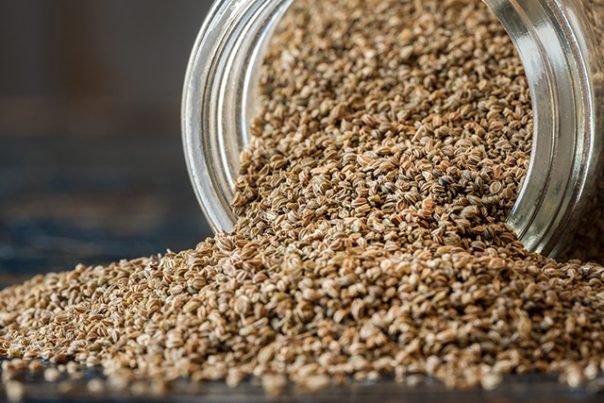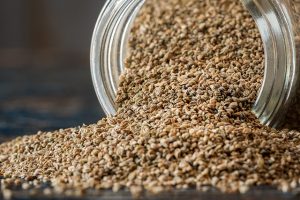
Celery Seeds – sources, health benefits, nutrients, uses and constituents at NaturalPedia.com
Saturday, July 22, 2017 by Frances Bloomfield
http://www.naturalpedia.com/celery-seeds-sources-health-benefits-nutrients-uses-and-constituents-at-naturalpedia-com.html

Celery seeds are the small, tan-colored, strong-smelling ovules derived from the flowers of the celery (Apium graviolens) plant. The seeds are actually tiny fruits packed with volatile oils that give the seeds their unique smell and sometimes bitter, sometimes sour taste. The flavor and aroma have made celery seeds popular as spices and flavoring agents in North American and European cuisine, while the volatile oils have made them a sought-after remedy in Ayurvedic medicine.

List of known nutrients
Celery seeds carry a variety of health-promoting nutrients, such as:
- Calcium
- Copper
- Coumarin
- Flavonoids
- Fiber
- Iron
- Linoleic acid
- Magnesium
- Phosphorus
- Potassium
- Vitamin C
- Volatile oils, including apiol
- Zinc
The combination of these nourishing substances has given celery seeds numerous health benefits and uses. While most popular as a diuretic, celery seeds can serve as anti-inflammatory, analgesic, antiseptic, and antispasmodic agents, to name a few.
Medicinal uses for celery seeds
Even today, celery seeds continue to be used to alleviate:
- Arthritis
- Bloating
- Dysmenorrhea
- Flatulence
- Gout
- High blood pressure
- Indigestion
- Inflammation
- Kidney stones
- Liver disorders
- Muscle cramps
- Premenstrual syndrome (PMS)
- Stress
- Urinary tract infections (UTI)
Celery seeds contain natural diuretic substances, making them incredibly useful for people suffering from kidney stones. The potassium content assists in the elimination of toxic wastes by stimulating the kidneys and bowels, in turn allowing the stones to pass from the body without much issue.
Besides the effects on the kidneys and bowels, the potassium in celery seeds reduces high blood pressure too. Potassium acts as a vasodilator, improving blood flow and circulation by widening the blood vessels. Moreover, the diuretic effects reduce fluid volume and lower blood pressure levels.
In addition to helping individuals deal with their kidney stones, celery seeds can benefit those with arthritis or gout, as excessive urination helps the body rid itself of the uric acid crystals that build up around joints. Furthermore, celery seeds are anti-inflammatory and therefore capable of soothing the pain associated with arthritis.
Celery seeds, as well as the oil and extract derived from them, have been used to treat all kinds of health conditions related to the menstrual cycle, including premenstrual syndrome and dysmenorrhea. This is because of apiol, a compound known to regulate menses and ease period cramps and pains. Because of this, however, celery seeds should be avoided by pregnant women as they can induce muscular contractions.
Body systems supported by celery seeds
Celery seeds are known to be good for:
- Cardiovascular system
- Digestive system
- Nerves
- Urinary tract, including kidneys
Celery seeds are useful for the maintenance of a healthy digestive system, namely by relieving digestive problems such as indigestion and bloating. The small amounts of fiber and vitamin C are helpful in this regard, since they encourage regular bowel movements.
Ways to use celery seeds
Celery seeds can be purchased fresh, dried, or in powdered form. Whole celery seeds are the ones mostly used in cooking, because ground celery seeds are more bitter in taste.
Celery seeds pair well with dishes made with tomatoes and vegetable juices. They can be used to impart soup stocks, mayonnaise dressings, and boiling liquid for shellfish with a warm, celery-like flavor.
One unusual but practical use for celery seeds is as a mosquito repellent. Leave out a lotion or gel concoction with a mixture of celery seed oil in a mosquito-infested area and watch them vacate the premises.
Where to learn more
- Home Remedies For Bladder Infection
- Lower blood pressure and improve health naturally with celery
- This Is What Will Happen to Your Body If You Eat Stalk of Celery A Day
- Top 14 Nutritional Powerhouses That Are Great For You
- What are the health benefits of eating celery stalks?
Summary
Celery seeds have an abundance of health benefits: they’re an excellent diuretic, average detoxifying agents, and reliable anti-inflammatory and analgesic agents. Though healthy and helpful overall, celery seeds should be avoided by pregnant women as celery seeds can lead to complications like contractions.
Sources include:
EatThisMuch.com
HomeRemediesWeb.com
BeWellBuzz.com
HealthBenefitsTimes.com
FineCooking.com
Tagged Under: Tags: Celery seeds





